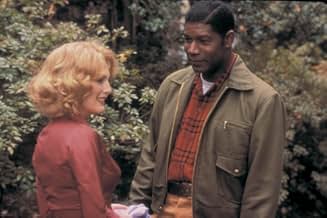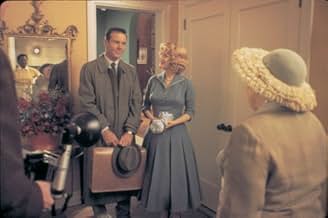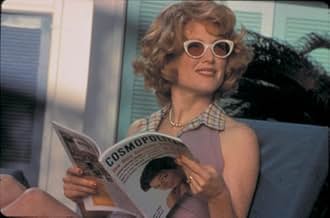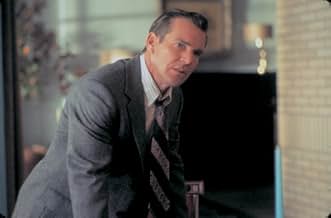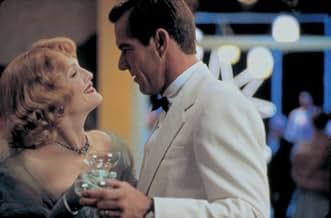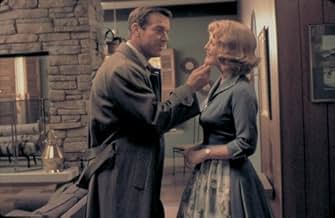Im Connecticut der 1950er Jahre sieht sich eine Hausfrau mit einer Ehekrise und wachsenden rassischen Spannungen in der Außenwelt konfrontiert.Im Connecticut der 1950er Jahre sieht sich eine Hausfrau mit einer Ehekrise und wachsenden rassischen Spannungen in der Außenwelt konfrontiert.Im Connecticut der 1950er Jahre sieht sich eine Hausfrau mit einer Ehekrise und wachsenden rassischen Spannungen in der Außenwelt konfrontiert.
- Für 4 Oscars nominiert
- 102 Gewinne & 96 Nominierungen insgesamt
- Sarah Deagan
- (as Jordan Puryear)
- Billy Hutchinson
- (as Kyle Smyth)
Empfohlene Bewertungen
It helps when writing a review of a film like this that you can throw round all the right references and draw comparison's wit the two Sirk films from which Haynes drew inspiration from. Sadly I can't do that as I haven't seen either of the works (although have seen some Sirk films), so I'll do the best I can! From the outset this film builds a plastic perfect 50's world before revealing that everything isn't as the outside world (and even those on the inside) may perceive. This works well but the film is strong because it works on several other levels past this one.
Past the fake nature of lives we are all human after all are several other broader themes that are not as clear but still important. The place of women is society is one where Frank's indiscretion appears to still let him work etc, Cathy much smaller crime sees her condemned from all around. Her relationship with Raymond shows how women held social status only as trophies in some circles and, when this role was threatened or made redundant, they had little more standing that blacks etc.
The two fallings of Frank and Cathy are parallel and it is interesting to see the two. Frank stigma that he must hide is one of sexuality while Cathy is less lucky in that her stigma is as clear to observers as the skin on Raymond's face. This is not to say that the film works as well on each of these levels, but it does work well enough on all of them. It is slow and patient and it may frustrate some audiences who will claim `nothing really happens' if a review says this then ignore it they have clearly missed the point.
The 50's feel is bang on and very well done. I'm not sure if Haynes has lifted the touches that make it feel `50's' from Sirk directly (i.e. copied) but it really works. The colours are lush and every set and costume feel like it must be straight from the 50's. It is to Haynes credit that he has done this without being camp or wistful in the way that many films set in the period can be. He plays it straight down the line.
The cast are roundly good. Moore deversedly got her nomination for this work and she is excellent. She never goes over the top but is visibly simmering throughout. Quaid is good but has a less complex character to carry, we don't get to understand what he is going through or felling is it deep guilt, lust, love etc? Haysbert in 24 is OK but plays a stiff, morally righteous man who is so `good' as to be difficult to swallow! Here it is not quite as bad but Raymond is still a ` good, wholesome' man. Haysbert does him well but again I wanted more to the character. The support cast are good and all play the plastic socialites and professionals of 1950's well.
Overall this film is very lush nothing but praise can be given to director, costumes and set designers etc. The cast are all good even if they must act with decorum and patience throughout and the emotion and drama of the story (although stilted and controlled) is still very involving. A very good film if it had been made in the 50's it would be held as a classic today.
Julianne Moore deserves an Academy Award for her portrayal of Cathy Whitaker, a homemaker whose idyllic life begins to disintegrate when she learns that her husband is gay. Moore's Cathy is a delicate woman who would like to be courageous, but can't be because of the world that she is trapped in. As her innocence begins to die, she realizes how empty and superficial her life is. When she begins a cautious romance with her black gardener (Dennis Haysbert) she begins to see the racism and hypocrisy that forms the underbelly of a seemingly perfect world. At the end of the film Cathy has no illusions, and realizes that the life that she thought was perfect is actually a never-ending hell.
Dennis Quaid is equally stunning as Cathy's tortured husband Frank. After Cathy discovers his homosexuality, the two are forced to grapple with a truth that neither of them can comprehend. Frank goes to a doctor for "treatment," and his confession is heartbreaking. He says that he "can't let this thing, this sickness, destroy my life. I'm going to beat this thing." We look at Frank and pity him because we realize that such a feat is impossible, and unnecessary, but Frank does not possess that knowledge. Frank begins to drink more, and when he finally breaks down and tells Cathy that he has fallen in love with another man, all of the anger, shame, and joy comes pouring out of him all at once. It is a supremely moving moment, and the best performance of Quaid has ever given.
As the marriage between Cathy and Frank begins to unravel, the two also begin to fight. All of Cathy and Frank's arguments and confessions take place at night, bathed in shadows. The truth has no place in this bright, artificial world, and it must stay hidden at all costs. One night, when Frank tries to make love to Cathy and can't, Cathy tries to placate him, saying that he is "all man" to her. At that remark Frank hits her, and for a moment the audience does not breathe. Cathy then asks quietly for her husband to get her some ice. Cathy is all restraints, and it is only with her kind gardener that she has a chance to break free. The scenes between Moore and Haysbert crackle with erotic energy because everything remains unsaid. When Cathy finally asks him to dance with her, it is a moment when we realize what human beings are capable of being together.
The fourth example of stellar acting comes from Patricia Clarkson as Cathy's best friend Eleanor. Eleanor is a bitter, gossipy, cold-hearted woman, and when she tells Cathy "I am your best friend," you want to scream to Cathy not to believe her. Clarkson makes the most of her rather limited screen time, and turns in a fascinatingly layered performance.
Far From Heaven may very well be the best picture of the year. In creating an artificial world, Todd Haynes has managed to lay bare the human soul in a way that has never been done before. It is a moving and important motion picture, populated with some of the most nuanced acting I have ever seen. Cathy and Frank Whitiker may be far from heaven, but the film comes about as close to heaven as is possible.
Cathy can't catch the clue when she bails Frank out of the police station and he mutters angrily about the arresting officers mistaking him for a "loiterer." A loiterer in a neat business suit with a topcoat in Hartford? Only one kind of well-dressed character like that attracted police attention in those days.
Dispensing good cheer everywhere, Cathy decides to bring dinner to her hardworking-at-night husband (no spoiler here, every media review has this part). And what should she find? Frank is in the arms of a man, kissing him actually, clothing in disarray.
Today, a presumably straight spouse or lover being gay, secretly, isn't a taboo subject. It was in Cathy and Frank's time and, in fact, no movie from that period would have touched this subject with a ten-foot boom mike. "An Affair to Remember" was risque enough.
Cathy insists Frank get help and James Rebhorn in a brief role as psychiatrist Dr. Bowman explains the most modern therapeutic approaches to "converting" Frank to exclusive heterosexuality. This was in the days when homosexuality was an official diagnosed mental illness.
In what could have been a familiar variation of the white/black awkward beginnings of friendship seen in Sidney Poitier movies but which in this instance has a refreshing originality, Cathy befriends gardener Raymond Deagan (Dennis Haysbert). An attractive and prominent white woman being seen in public with a black man in the South at this time would have led to probably horrific repercussions. Here we get to see 1950s racist northern suburbia, people who decry Arkansas obduracy (there's a brief shot of President Eisenhower on TV announcing the despatch of the 101st Airborne Division to confront the state's mad governor at Little Rock High School) while dispensing their own venom. No guns, no lynchings, no white sheets - just an insidious degradation of blacks, reducing them to actual invisibility when convenient.
The friendship between Cathy and Raymond is at first tentative and it grows with affecting tenderness. So does the shocked anger of the wealthy gaggle in Frank and Cathy's social circle.
Is Frank cured of his "illness?" Does racial tolerance and respect for diversity seep into Hartford's tony neighborhood? Does everyone live happily ever after? Go see the film. The mid-afternoon packed audience in Manhattan's Lincoln Plaza Cinema broke into applause at the end.
Viola Davies turns in a small but critically important role as the Whitaker's maid, Sybil. Fine acting.
Director Todd Haynes allowed Moore and Quaid to make their roles real, involving, and anguished and funny in turn. Both stars deserve Oscar and Golden Globe nominations.
Rooted in the 50s in many ways, composer Elmer Bernstein turned out a good score, original rather than depending on recognizable tunes from the time. But as is so often the case, at points the score is unduly intrusive where the actors' words and expressions convey all that is necessary, music being an annoyance.
8/10.
Wusstest du schon
- WissenswertesCinematographer Edward Lachman created the 1950s "look" by using the same type of lighting equipment (incandescent), the same lighting techniques, and the same type of lens filters when shooting this film, as would have been used on a 1950s era melodrama.
- PatzerThe typewriter around the corner from Frank Whitaker's office is a late-model Selectric (circa 1971 at the earliest).
- Zitate
Cathy Whitaker: That was the day I stopped believing in the wild ardor of things. Perhaps in love, as well. That kind of love. The love in books and films. The love that tells us to abandon our lives and plans, all for one brief touch of Venus. So often we fail at that kind of love. The world just seems too fragile a place for it. And of every other kind, life remains full. Perhaps it's just we who are too fragile.
- Crazy CreditsThe first end credit reads "for Bompi"
- VerbindungenFeatured in Anatomy of a Scene: Far from Heaven (2002)
Top-Auswahl
- How long is Far from Heaven?Powered by Alexa
Details
- Erscheinungsdatum
- Herkunftsländer
- Offizielle Standorte
- Sprache
- Auch bekannt als
- Lejos del cielo
- Drehorte
- Produktionsfirmen
- Weitere beteiligte Unternehmen bei IMDbPro anzeigen
Box Office
- Budget
- 13.500.000 $ (geschätzt)
- Bruttoertrag in den USA und Kanada
- 15.901.849 $
- Eröffnungswochenende in den USA und in Kanada
- 211.279 $
- 10. Nov. 2002
- Weltweiter Bruttoertrag
- 29.027.914 $
- Laufzeit
- 1 Std. 47 Min.(107 min)
- Farbe
- Sound-Mix
- Seitenverhältnis
- 1.85 : 1


